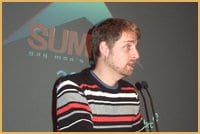Representatives from more than 30 organizations met in Vancouver last week for the third annual Gay Men’s Health Summit, which took place at UBC Robson Square, Nov 1-2.
The event, attended by about 140 people, was organized by the Community Based Research Centre in partnership with Gayway and the BC Centre for Disease Control. “The turnout included people working and volunteering in gay men’s health and HIV prevention, from the both the community and public health sectors,” says organizer Rick Marchand.
In his keynote address, former director of the BC Centre for Excellence in HIV/AIDS Michael O’Shaughnessy took a moment to pause and scan the room.
“I’d like to recognize all the HIV-positive people I see here today,” he said. “I see many who were here back in 1992 and are still here today. Back in 1984 you would get to know someone with HIV/AIDS and they’d die two years later.”
According to O’Shaughnessy, approximately 200 new HIV infections were reported in 2006 by the Vancouver Coastal Health Authority. In addition to the human toll of the disease, he noted that the 200 new infections also cost the health care system in direct medical costs.
Of the 196 newly reported HIV infections in Vancouver last year, 119 were men who have sex with men, 30 were intravenous drug users, 12 were men who have sex with men who were also intravenous drug users, and 22 were heterosexual, O’Shaughnessy reported.
“There are probably 14,000 people in BC with HIV and 15-20 percent don’t know they have the virus,” he added.
One of the impediments to disclosing HIV status is the stigma associated with having the virus, say Glyn Townson and Melissa Davis of the BC Persons with AIDS Society (BCPWA).
In an effort to fight that stigma, BCPWA ran two television and radio advertisements from July 2006 to June 2007. One ad featured a mother and daughter talking in a kitchen; another featured two men chatting in a grocery store. When one man tells the other he has a cold, the man replies, “At least I’m not going to die because I’m a careless fairy.”
“We’re 25 years into HIV, and HIV stigma is still one of the most destructive things,” says Davis. “The intention of the ads was to elicit discomfort; the language is very cutting.”
“People were either really for or really against the ads,” says Townson. “There was not much of a middle ground here. The largest number of complaints came from people who identified themselves as sympathetic to persons with AIDS. This campaign was a good start.”
But HIV and AIDS are not the only health issues for gay men, noted Bill Ryan, a professor of social work at McGill University and chair of Action Sero-Zero, a Montreal health organization for gay men.
Though many services dedicated to gay men’s health are focused on HIV/AIDS support, prevention and treatment, Ryan believes more can be done to assist gay men with their mental health.
“So many gay men express their loneliness and isolation. I knew this Mexican gay man who was so happy to move to Canada and be out and open about his sexuality. But when he went to the bars nobody was interested. There are not many social places to meet outside of bars.”
Ryan also highlighted some of the unseen barriers to wellness that many gay men still encounter when trying to access health care. “They often have a fear of rejection from health care providers, a fear of disclosing their orientation. Sometimes they will put off the visit until it’s too late,” he said.
Sero-Zero is the only gay men-specific HIV organization in Canada, but there needs to be more, says Phillip Banks who works at AIDS Vancouver.
“When I look at the landscape of organizations mandated to do HIV-related work, I see the Pacific AIDS Network with a 40-organization membership and not one of them is gay-men specific,” he says. “When I look at Vancouver Coastal Health and the Provincial Health Service Authority’s contracted agencies doing HIV work none is gay-specific.
“What’s the population in this city, this province, this country with the highest number of reported new HIV diagnoses? What’s the population with the highest representation of people living with HIV?
“And what’s a population whose prevalence estimates could be compared to a country where HIV is endemic? The answer to all of these is gay men.”
Event organizer Michael Kwag describes this year’s summit as the best yet.
“We’ve definitely seen an increase in attendance from last year and I would say it exceeded our expectations, so we were certainly pleased from the turnout this year,” he says.
Participants came from Vancouver, Vancouver Island, Ontario, Quebec, the United Kingdom, and Australia.
“The summit is certainly getting more exposure, both nationally and internationally but so we’re still trying to connect with the local guys in province. We’re certainly glad that on the local level we were so well attended,” Kwag says.

 Why you can trust Xtra
Why you can trust Xtra


